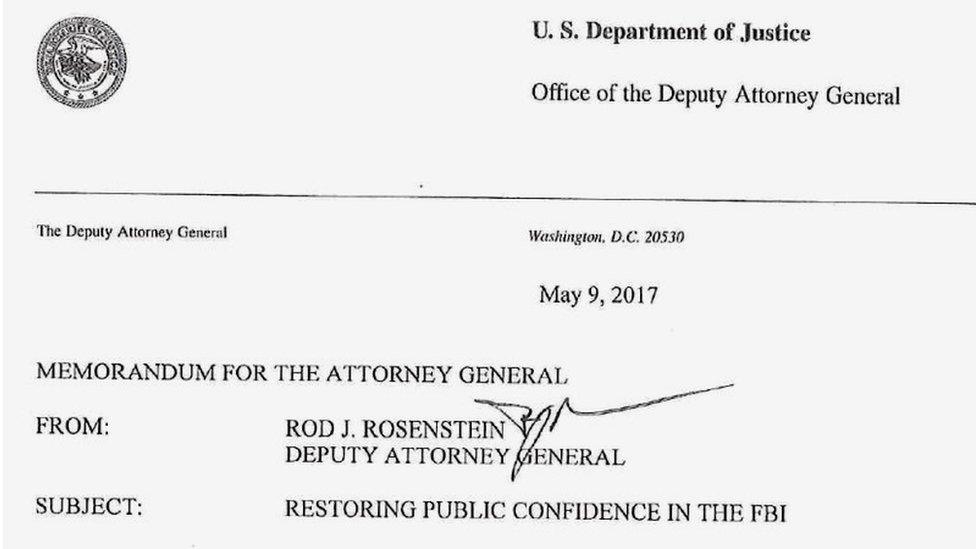Trump/Comey: What's this week's political firestorm actually about?
- Published
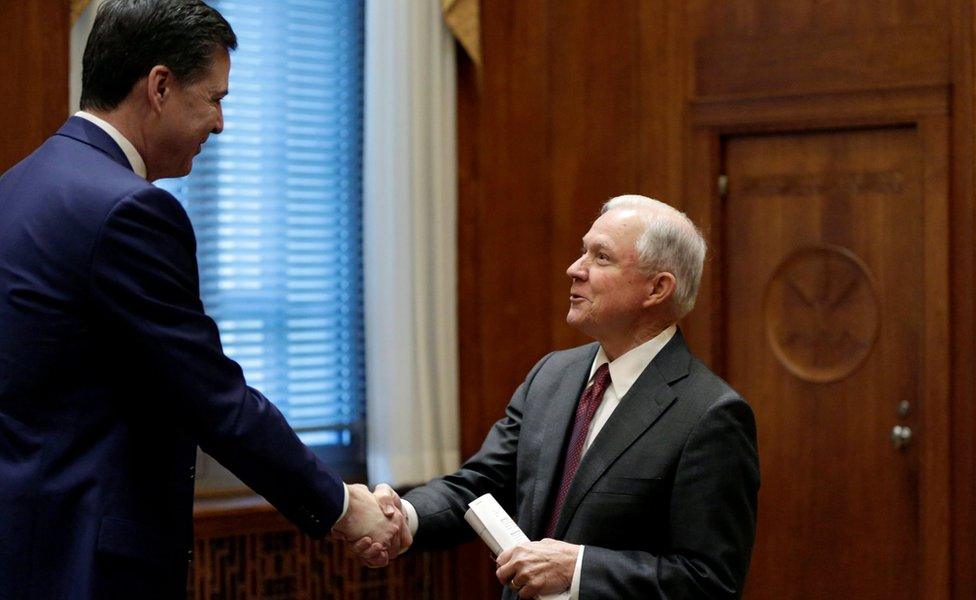
Toppled from a great height - now ex-FBI director James Comey
The bigger they are, the harder they fall - the saying goes.
At well over 2m tall and serving as head of the FBI as the US president sparred openly with the agency, James Comey was, until Tuesday, a significant figure in all senses of the word.
His downfall has caused a seismic reaction in Washington that is continuing to reverberate, and it appears the dust will not settle for some time.
If you've been tuned out of the news in the last few days, or are simply feeling lost amid the maelstrom of headlines, conflicting explanations, leaks and speculation (and who could blame you), we're here to set you straight.
Put your feet up, and let's go back to the basics of this complex story.
The Clinton emails. (Yes, those again. Briefly, we promise.)
James Comey was fired on Tuesday by President Trump, and the first, official explanation for the decision given by the White House was that it was due to his botched handling of the conclusion of the FBI investigation into Hillary Clinton's use of a private email server when she was secretary of state.
That explanation would almost immediately be contradicted by news reports and later the president himself. But let's put that aside for one moment.
To understand why James Comey is a household name in the first place (his predecessor Robert Mueller headed the FBI for 12 years - but you may not know his name) it's important to recall that he made two key interventions during the presidential campaign.
In July 2016, he publicly stated that Mrs Clinton had been careless but not criminal in handling sensitive material on her private email server, and that she should not be prosecuted.
Then, 11 days before November's election, when Mr Comey dropped a bombshell, saying he had reopened the inquiry because new Clinton-related emails had been found. The Clinton camp were furious but Donald Trump said the decision "took guts".
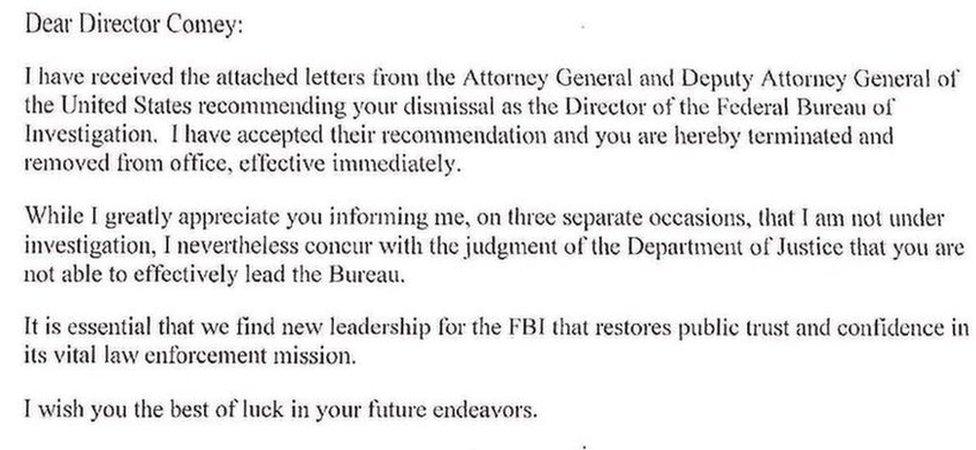
Mr Trump's letter dismissing Mr Comey was released by the White House on Tuesday
Two days before the election Mr Comey said the emails had been reviewed, and nothing had actually changed - Mrs Clinton should still not face criminal charges.
Mr Trump changed his tune, and the FBI director was later blamed by Democrats for Mrs Clinton's election loss.
OK, but what about the whole Russia thing?
This is the piece of the James Comey story that explains why his firing has led to such a furore.
As you're probably aware, the US intelligence community believes that the Russian government hacked Democratic Party and Clinton campaign emails in order to help Mr Trump win the election.
President Trump has continuously pushed back against that finding, and has been angered by an FBI investigation into the alleged interference that is also specifically examining possible links (and cooperation) between figures in his campaign and the Russian government.
In March, Mr Comey said publicly the FBI would "follow the facts wherever they lead".
It is for this reason that there has been so much shock and outrage to Mr Comey's sacking.
For many commentators, it was a blatant attempt to hurt the investigation - and Democrats are now calling for a special counsel to be appointed to lead the inquiry to protect its independence.
No one can read the president's mind. (Luckily you don't need to if he ends up saying what he was really thinking.)
The firing of James Comey was always going to be controversial but President Trump had at least one strong argument to deploy: many Democrats had called for the FBI director to step down after the Clinton email saga - so why should they kick up such a fuss now that it had happened?
But from the outset, President Trump made it clear that there were other things on his mind when he took the decision to fire Mr Comey aside from his handling of the Clinton email investigation.
In his initial letter saying he was acting on recommendations from Attorney General Jeff Sessions and Deputy Attorney General Rod Rosenstein, he explicitly noted that Mr Comey had informed him "on three separate occasions" that he was not personally under investigation in relation to the Russia inquiry.
How the White House's story on Comey collapsed
From there, things began to unravel. In his first in-person explanation Donald Trump said he fired Comey because he was "not doing a good job".
He spoke while sitting next to Henry Kissinger, President Nixon's former national security adviser, which made for a bizarre optic given that some comparisons were already being made to the Watergate scandal.
Later on Wednesday, Mr Trump also met the Russian foreign minister and Russian ambassador to Washington in another bit of awkward timing.
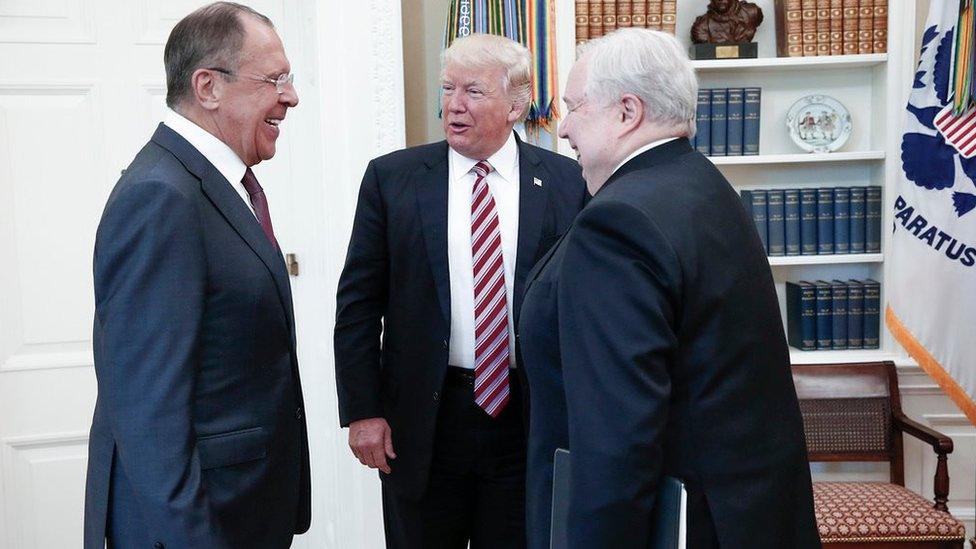
Photos of the closed-door meeting with Russian Foreign Minister Sergei Lavrov and Russia's US Ambassador Sergei Kislyak were released by the Russian government
Then on Thursday, in an NBC interview, the US president said he had actually alone decided to fire Mr Comey - who he called a "showboat" and "grandstander".
He also said that he was thinking about the "Russia thing" when he made the decision.
These comments of course contradicted his team's earlier explanations that the recommendation from Mr Rosenstein in particular - painted as a man of integrity and independence - had prompted the firing, rather than any politically-motivated reasoning.
On Friday, the president admitted on Twitter there had been inaccurate and conflicting statements, but then angrily suggested that all White House press briefings should be cancelled for "accuracy".
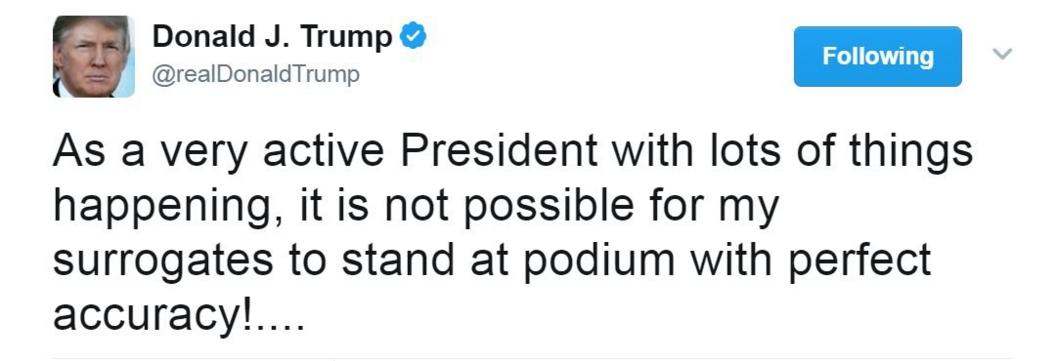
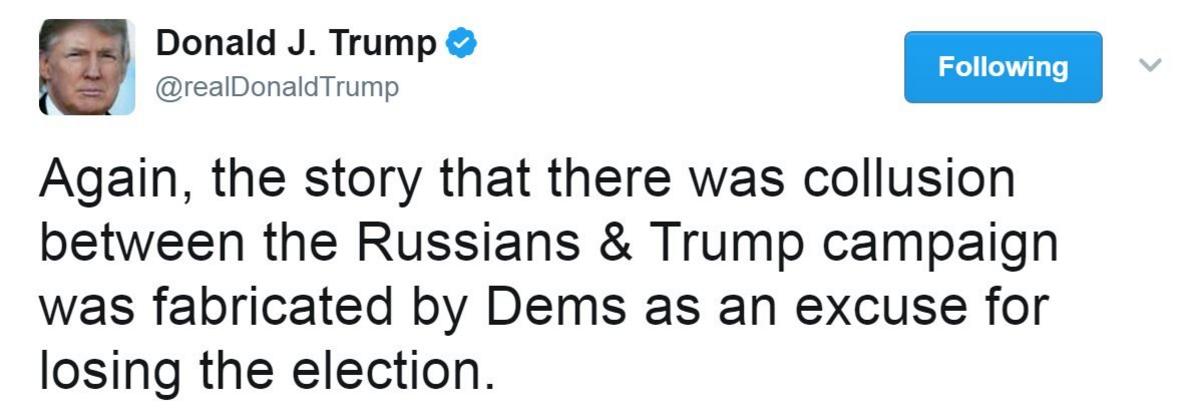
Where do we go from here?
In his NBC interview the US president also described a January dinner with James Comey at which he was told he was not under investigation. He said Mr Comey had requested the dinner because he wanted to keep his FBI job.
The New York Times is also reporting that the president asked Mr Comey for a pledge of loyalty - and he said no. The White House denies the story.
Katty Kay: Is Trump's thin skin to blame?
It's unlikely that Mr Comey will not eventually respond to Mr Trump's assertions, and the stage is set for further dramatic confrontation as the president has suggested he might have recorded their conversations.
He tweeted on Friday: "James Comey better hope that there are no 'tapes' of our conversations before he starts leaking to the press!"
In front of the TV cameras hours later, White House Press Secretary Sean Spicer wouldn't comment on whether the president is recording conversations.
If we've re-learnt one definite lesson this week, it's that it's not easy to be a spokesperson for the 45th president.
- Published11 May 2017
- Published12 May 2017
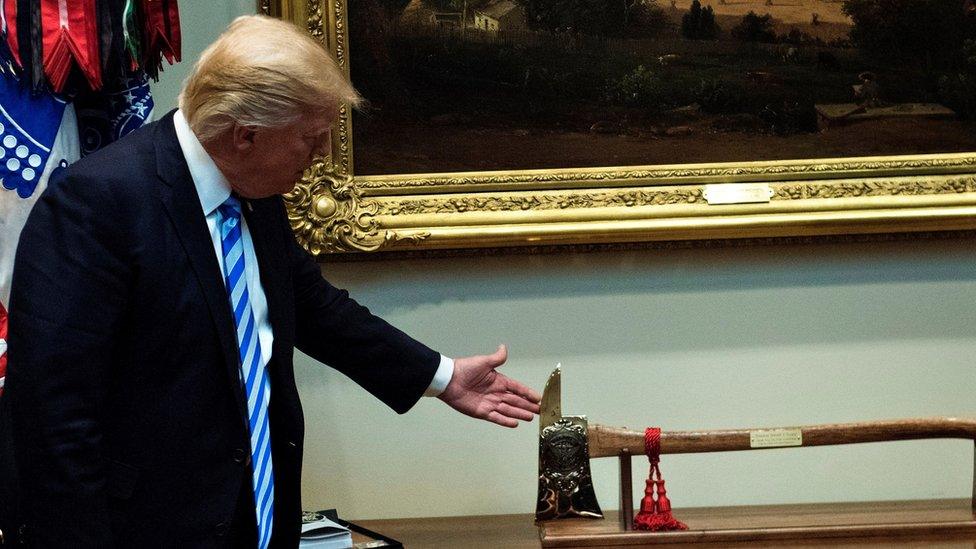
- Published12 May 2017
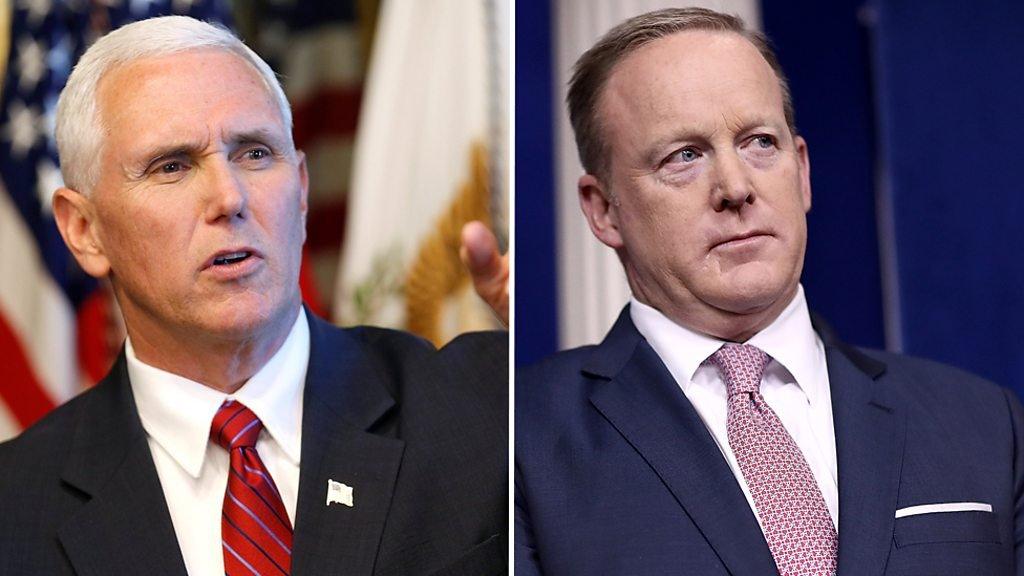
- Published11 May 2017
- Published7 June 2017
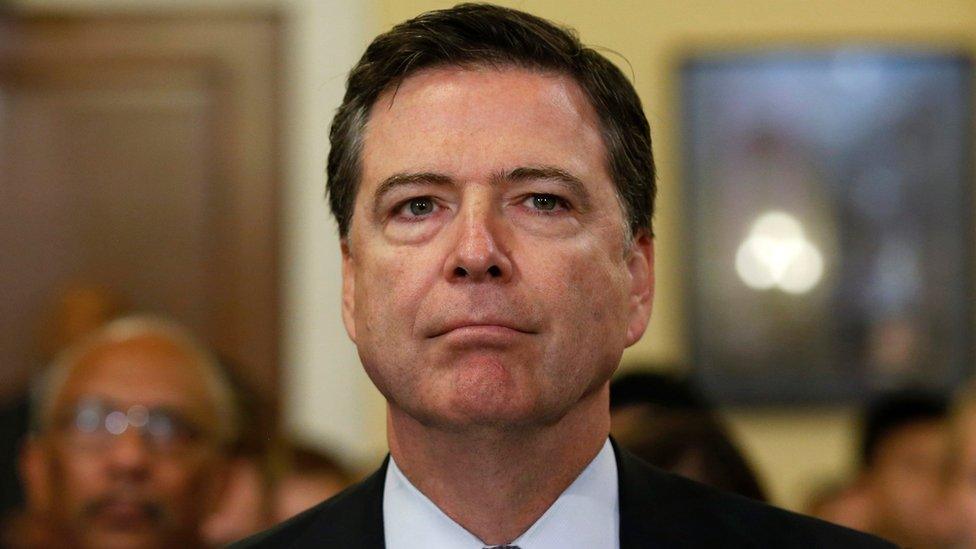
- Published10 May 2017
